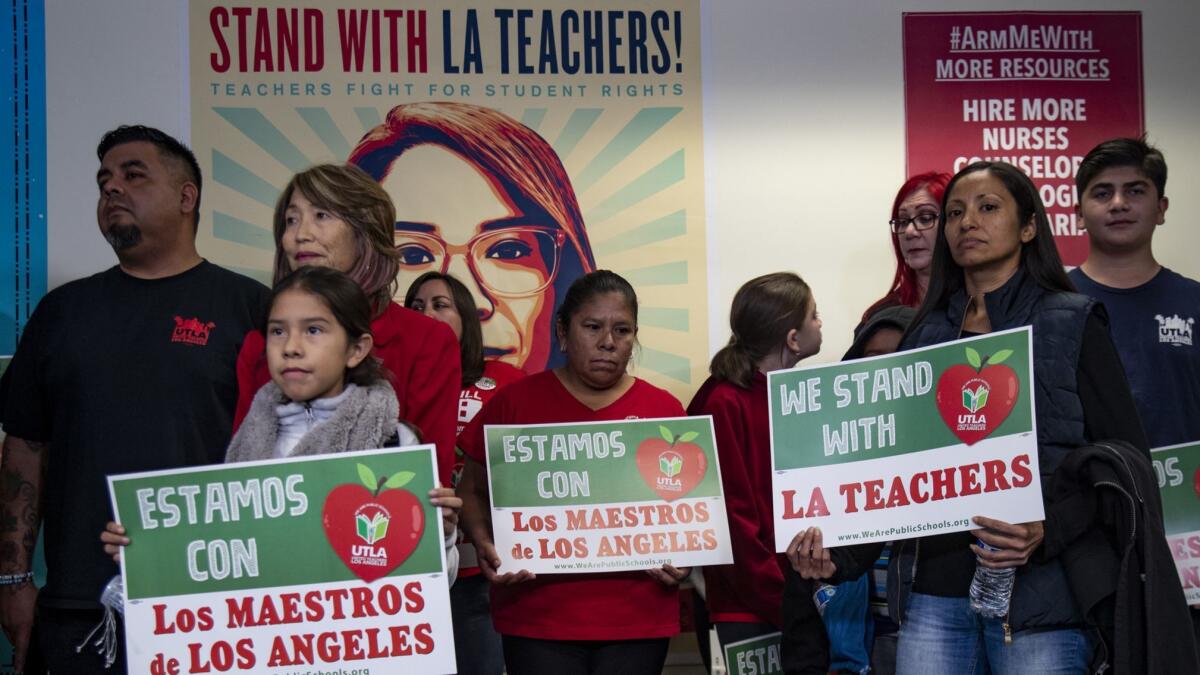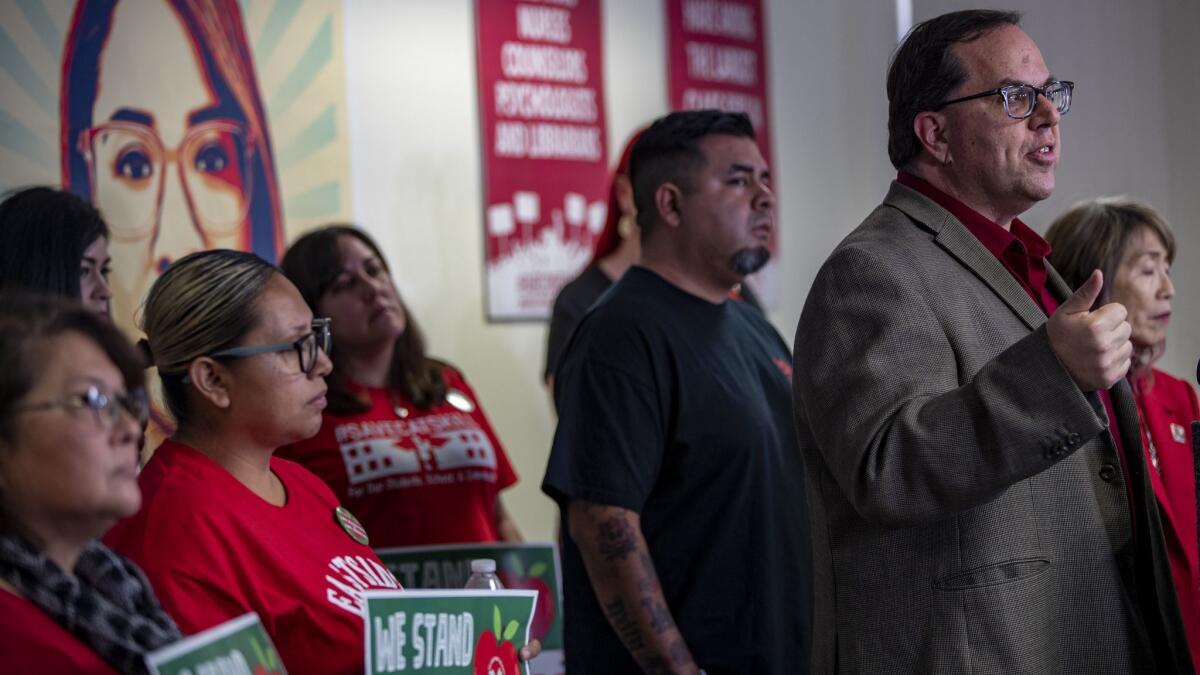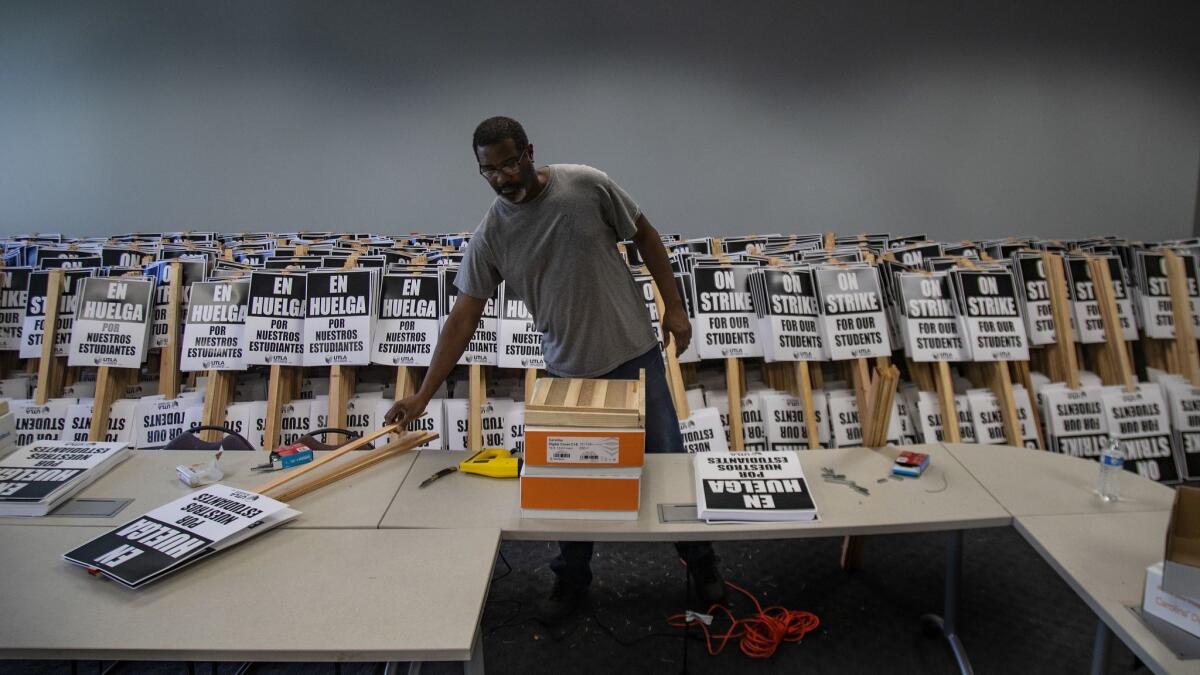L.A. teachers union rallies supporters with call for cap on charter schools

- Share via
In its 69 pages of demands to the school district, the union representing Los Angeles teachers barely touches on charter schools. But as they prepare for an announced strike on Jan. 10, union leaders are making the growth of these schools a focus to rally members and raise public awareness of what they see as an existential threat.
On Friday union President Alex Caputo-Pearl called for a halt to new charter schools in the district. It’s the latest escalation in the union’s anti-charter rhetoric.
“It’s time to invest in our existing schools,” said Caputo-Pearl, who heads United Teachers Los Angeles. “This unregulated growth is something that affects the long-term sustainability of the district. … This is about protecting the civic institution of public education.”
Charter supporters take issue with the union’s targeting. They say charters have provided valuable educational choices and have proved popular with parents.
L.A. schools Supt. Austin Beutner on Friday said it was wrong to characterize the dispute “as a referendum on charter schools.”
In an interview on Spectrum News, a cable channel, Beutner said “all schools should be looked at with the same tough set of standards.” For the teachers union, he said, “the difference is charter schools don’t have UTLA members, traditional public schools do.”
About 1 in 5 Los Angeles public school students now attends a charter. L.A. has more charters and more charter students than any other school system in the country. This growth has been substantially fueled by federal grants and donors, who include conservative and anti-union forces as well as some independents and Democrats.
Charters are privately managed and while most are nonunion, Caputo-Pearl said that his union represents about 1,000 charter-school teachers and that existing charters that are struggling with enrollment also are being hurt by the “grow at any cost” strategy of some charter advocates.

He also noted that because funding follows the student, charter expansion has drained funds from L.A. Unified, which also is losing enrollment based on unrelated demographic trends.
Fewer students means fewer teachers. And while a drop in enrollment should lower district expenses, the district has had a hard time shrinking and also is burdened with fixed costs for such things as school maintenance and retiree health benefits.
Union leaders “reason that the dramatic expansion of charter schools in Los Angeles over the last decade — an expansion fueled by funding from [Eli] Broad, the Walton Family Foundation and the Gates Foundation — has heightened instability and undermined the capacity of the system as a whole,” said UCLA education professor John Rogers. “UTLA leadership envisions creating a new reality on the ground that will change the dynamics of education in Los Angeles.”
The district also has a new reality in mind — a still mostly confidential plan to divide the nation’s second-largest school system into about 32 networks. The limited disclosure has exacerbated union fears about the goals of Beutner, a successful businessman without a background in working for or managing a school district.
While Beutner has called for a coming together with teachers, he’s also made comments that increase their anxiety.
“So [if] it’s the flexibility of charter schools that’s allowing them to excel, let’s bring that flexibility into the traditional school classroom,” he said in the TV interview on Friday.
But charter school growth and reorganization plans are not part of contract talks.
In its proposal to the district, the union devotes one page to charters — specifically to what happens when a charter shares a campus with a district-operated school.
These sharing arrangements, called colocations, are required by state law. But they frequently led to disputes over space as well as to protests against a charter’s presence.
The union proposal calls for notice by Nov. 15 of the preceding school year when a charter applies for space. UTLA also wants to establish a colocation coordinator who would get a $2,000 stipend and be involved in all discussions regarding logistics. In addition, the union wants an advisory panel at each affected campus that includes teachers, parents, the plant manager and the principal of the traditional school.
They are the union’s response to complaints from staff at traditional schools, which have had to surrender space set aside for computer rooms, tutoring and extracurricular programs.

L.A. Unified has opposed the union’s colocation proposals without much explanation. But there could be concerns about creating a new, potentially cumbersome bureaucratic layer or about letting the union interfere in district administrative decisions. That’s an issue the district has raised about many of the union demands.
Some district officials, notably school board member Nick Melvoin, have sought to ease tensions over campus sharing by sponsoring something very close to group therapy. Using donated funds, Melvoin organized a summer retreat at a local resort hotel that brought leaders of charters and district-operated schools together to get to know each other and talk.
To be sure, many union activists don’t particularly want to get along with charters. They see the charter incursion as too much of a threat.
A strike, if it happens, won’t be over a charter moratorium. But by bringing up the issue now, the union is taking advantage of the sudden spotlight turned on by the strike threat.
The strike “won’t directly settle any of the underlying issues,” said Charles Kerchner, a scholar on labor relations and a professor emeritus and the Claremont Graduate University. “Hence, the charter school wars will continue.”
Twitter: @howardblume
More to Read
Sign up for Essential California
The most important California stories and recommendations in your inbox every morning.
You may occasionally receive promotional content from the Los Angeles Times.











